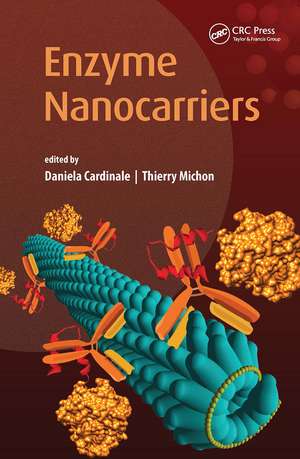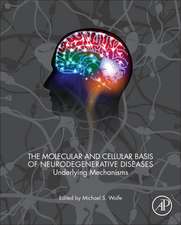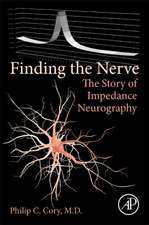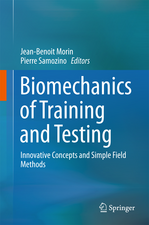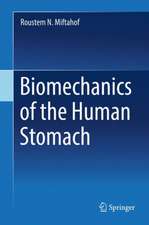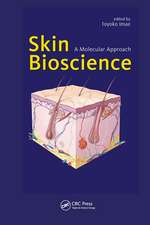Enzyme Nanocarriers
Editat de Daniela Cardinale, Thierry Michonen Limba Engleză Hardback – 9 oct 2015
The research presented in this book was selected among the most impressive achievements in the fields of enzyme bioconjugation and bioinspired nanosupports. It opens up potential applications in nanocatalysis and for lab-on-a-chip and biosensor devices, drug delivery vectors, and nanometrology. Most of the supports described pertain to soft materials (cells, virus, polymers, DNA) and most of the examples benefit from the amazing properties of proteins and DNA to self-assemble, according to the "bottom-up law," a specific feature of all living systems. The enzyme nanocarriers also have the potential to be grafted on solid supports through "top-down" technologies, spanning orders of magnitude from the nano- to the mesoscale and above. The book is a rich source of inspiration for researchers seeking to build smart materials requiring nanoscale positional control of functional proteins on various carriers.
Preț: 654.05 lei
Preț vechi: 877.39 lei
-25% Nou
Puncte Express: 981
Preț estimativ în valută:
125.15€ • 130.67$ • 103.58£
125.15€ • 130.67$ • 103.58£
Carte tipărită la comandă
Livrare economică 04-18 aprilie
Preluare comenzi: 021 569.72.76
Specificații
ISBN-13: 9789814613422
ISBN-10: 9814613428
Pagini: 266
Ilustrații: 60 black & white illustrations, 10 colour illustrations
Dimensiuni: 152 x 229 x 20 mm
Greutate: 0.52 kg
Ediția:1
Editura: Jenny Stanford Publishing
Colecția Jenny Stanford Publishing
ISBN-10: 9814613428
Pagini: 266
Ilustrații: 60 black & white illustrations, 10 colour illustrations
Dimensiuni: 152 x 229 x 20 mm
Greutate: 0.52 kg
Ediția:1
Editura: Jenny Stanford Publishing
Colecția Jenny Stanford Publishing
Public țintă
Academic and PostgraduateCuprins
Virus diversity to explore various kinds of enzyme nanocarriers. Strategies for virus coupling of enzymes. Viruses as model nanoreactors to study enzyme. Nanoscale compartmentalization techniques in cascade catalysis. Nanocarriers for Therapeutic Enzymes. DNA-origamis as protein. Nanopatterning for nanobiotechnologies: emerging methods based on soft-lithography and directed.
Notă biografică
Daniela Cardinale is postdoctoral researcher, since 2010, at the French National Institute of Agricultural Research (INRA), France, where she has integrated Dr. Thierry Michon’s team and investigated different strategies aiming to a positional control of enzymes on viral particles. She was awarded a PhD in biochemistry at the University of Modena and Reggio Emilia, Italy, in 2009. She was an invited team member of the Laboratory for Optics and Biosciences in Palaiseau, École Polytechnique, France, between 2007 and 2009.
Thierry Michon is project leader at INRA since 2001. He was awarded a PhD in enzymology at the University of Aix-Marseille II, France, in 1992. In 1993, he accepted the position of researcher at INRA in Nantes. Between 1998 and 2001 he was an invited scientist at the California Institute of Technology and worked in close collaboration with Prof. D. Tirrell. His current research focuses on possible correlations between virus evolution and the intrinsic disorder found in viral proteins and the development of virus-based enzymes nanocarriers (ENCs) for nanotechnology applications.
Thierry Michon is project leader at INRA since 2001. He was awarded a PhD in enzymology at the University of Aix-Marseille II, France, in 1992. In 1993, he accepted the position of researcher at INRA in Nantes. Between 1998 and 2001 he was an invited scientist at the California Institute of Technology and worked in close collaboration with Prof. D. Tirrell. His current research focuses on possible correlations between virus evolution and the intrinsic disorder found in viral proteins and the development of virus-based enzymes nanocarriers (ENCs) for nanotechnology applications.
Recenzii
"A timely and well-presented treatise on the evolving use of biological assemblies for nanocarriers of enzymes with potential applications in catalysis and the delivery of enzyme therapeutics. In seven chapters the expert authors describe the utility of viruses, polymersomes and DNA origamis. The book will be of great value not only to the specialist but also to others with a general interest in the broader field of bionanotechnology."
— Prof. David J. Evans, University of Hull, UK
— Prof. David J. Evans, University of Hull, UK
Descriere
Enzyme immobilization on solid supports has been considered for a long time as an attractive solution to perform sophisticated organic synthesis, as required in the preparation of fine pharmaceutical chemicals. But in the late 1990s, the tremendous progress in molecular biology fundamentals opened up the possibilities to feed a tool box for building new bio-inspired nanotechnologies. The research presented in this book was selected among the most impressive achievements in the fields of enzyme bio-conjugation and bio-inspired nanosupports. It opens up potential applications in nanocatalysis and for lab-on-a-chip and biosensor devices, drug delivery vectors, and nanometrology.
